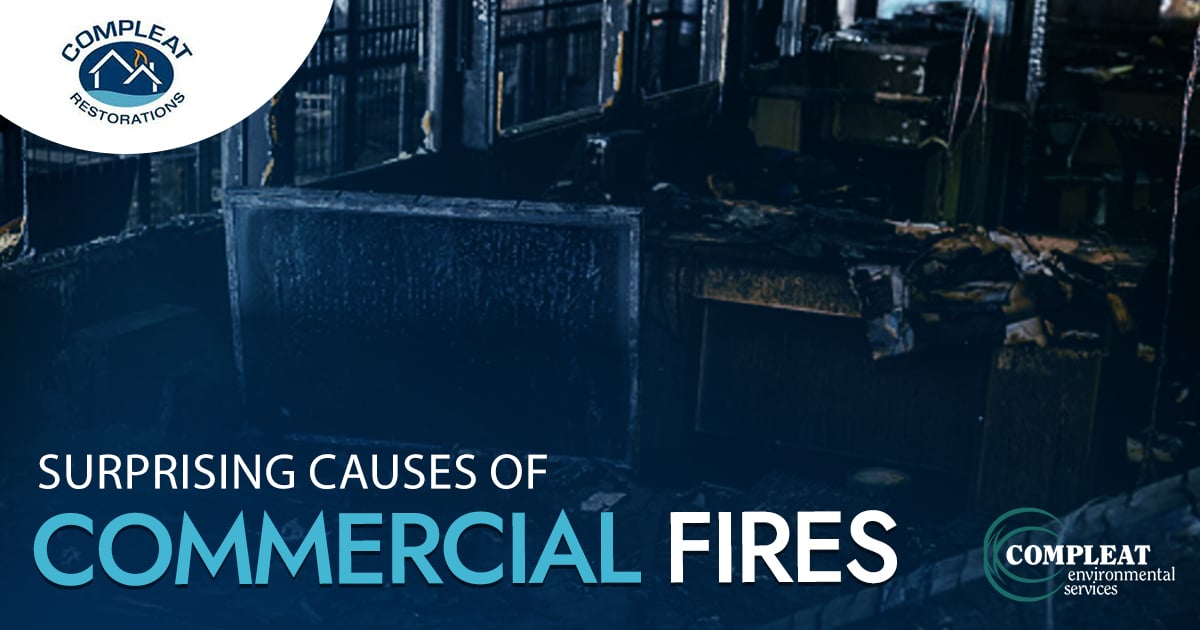Fires pose serious threats and can lead to the loss of property, productive hours, and even risk lives. Many are already familiar with the most common fire starters in commercial buildings: cooking and heating equipment, electrical and lighting equipment, and smoking. There are, however, less common causes of commercial fires that we need to be also vigilant about as businesses and homeowners.
The following are six unusual fire starters, as well as some ways to prevent fire damage in your commercial establishment or residential building.
1. Cleaning with solutions and other chemicals
Cleaning solutions come with instructions for safe and proper storage. You need to be familiar with these, especially if you’re storing different chemicals in a utility room or under the sink in break rooms. When mixed or exposed to heat due to improper storage, certain chemicals may trigger a flame.
To prevent commercial fires originating from your cleaning solutions and other chemicals, always read product labels and store them as recommended. If storing instructions are not found on the labels, search for their safety data sheets. These can provide information on where to properly store chemical containers and what to avoid when storing them.
2. Animals
Some of the most unusual fire starters can involve animals. Here are some examples:
- A bird may build its nest near electrical wiring or on top of structures that may heat up.
- Mice can chew up electric wires and cause it to short-circuit.
- A report by the London fire brigade promoting fire safety listed a pigeon that dropped a lit cigarette down a blocked chimney as one of the strangest causes of fire they have ever seen.
Keep your building safe from animal-related fires by regularly checking for birds building their nests near hot areas, setting traps for mice, and covering trash cans to avoid attracting other animals.
3. Combustible Dust
We already know we don’t like dust, but here’s another reason to grab that vacuum cleaner. Most types of dust can be flammable. Even materials that are not readily combustible in larger pieces can become fire risks when they are in the form of dust particles.
Reports from the National Fire Protection Association list down dust explosions as one of the causes of building fires. These dust explosions usually come in two stages:
- The first stage disturbs deposited dust causing it to be airborne
- The second stage, and stronger explosion, involves the now-suspended dust particles.
You need to set up a housekeeping program with regular cleaning times to minimize the accumulation of dust. Make sure to vacuum hard-to-reach areas like corners and under heavy furniture. If you’re able to, install dust collection systems with a spark detection feature in your building.
4. Empty Glass Jars
Disposing of empty jars and other glass containers may not be something we give much thought to. We usually just put them where there is enough space. Leaving glass jars in areas directly hit by sunlight may start a fire when the glass refracts the light onto nearby curtains, piles of paper, or other flammable items.
While glass is a very unusual cause of commercial fires since the angle at which the light hits the glass must be precise to trigger a flame, it is still wise to keep empty jars away from windows and other open areas.
5. 9-Volt Batteries
We use 9V batteries for many devices, including smoke detectors, communication radios, medical devices, speakers, and industrial meters. These batteries can be potential fire hazards if not stored and disposed of properly. The positive and negative posts of a 9-volt battery are close to each other. If metal touches both posts, it can generate enough heat to start a fire. Even weak batteries, which we usually toss out, can cause a fire.
You should keep both new and drained 9-volt batteries away from metals such as paper clips, steel wool, aluminum foil, keys, and other batteries. Until the time you need to use them, keep your batteries in their original packaging.
When it’s time to dispose of the batteries, take them to your city’s collection facility for hazardous waste. Do not throw them in the regular trash bin.
6. Overheating Computers and Laptops
Catching fire from computers and laptops may be uncommon, but it happens. Possible causes for computers and laptops catching fire include the following:
- Defective fans or batteries
- Prolonged use or charging
- Faulty or worn-out cables
- Exposure to high temperatures
Laptop designers have also created their products to be thinner and lighter, which can also mean the casing is more fragile and offers less protection from external heat.
To ensure that your computers and laptops are working well, check vents and fans from time to time. You should also place your laptop on a firm, level surface or use a cooling stand.
While using your computer, check its operating temperature. Most laptops operate from 50oF to 95oF. If you feel they have been overheating frequently, call a computer technician to inspect your unit.
What to Do in the Case of Commercial Fires
While every measure must be taken to prevent commercial fires from happening, you must always be ready when disaster strikes. Organize and be familiar with your building’s evacuation plan. Make sure all occupants know the locations of the fire extinguishers and fire exits.
In case of a fire, everyone should evacuate calmly and quickly. Alert those around you about the fire emergency by shouting “fire” or activating the nearest fire alarm pull station.
However, do not attempt to extinguish the fire unless you have been trained to do so. When you are safely out of the building, call the fire station immediately.
When the fire is out and everyone is brought to safety, starting the fire restoration process may be complicated. Make sure to contact trusted professionals at Compleat Restorations to do fire damage restoration work and assist you in bringing your fire-damaged property back to its prime condition.



